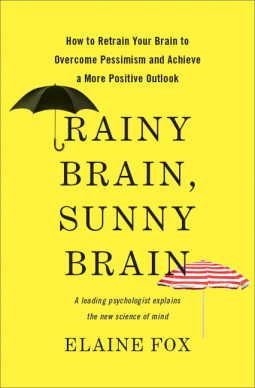
Rainy Brain, Sunny Brain
How to Retrain Your Brain to Overcome Pessimism and Achieve a More Positive Outlook
by Elaine Fox
This title was previously available on NetGalley and is now archived.
Send NetGalley books directly to your Kindle or Kindle app
1
To read on a Kindle or Kindle app, please add kindle@netgalley.com as an approved email address to receive files in your Amazon account. Click here for step-by-step instructions.
2
Also find your Kindle email address within your Amazon account, and enter it here.
Pub Date Jun 05 2012 | Archive Date Sep 01 2012
Perseus Books Group | Basic Books
Description
Optimism and pessimism, Fox shows, can be boiled down to a single question: whether we're more inclined to seek pleasure or avoid danger. People whose primary impulse is toward the former are more likely to see the opportunities in life and downplay the risks; people who are more concerned with avoiding danger, on the other hand, tend to look at opportunities and see only the worst possible outcome. To a certain extent, our genetics determine which camp we fall into-but Fox shows that this genetic predisposition actually hinges upon a complex mix of environmental and neurological factors. By following the inclinations hard-wired into our brains, we sensitize and strengthen key brain circuits, eventually forming powerful cognitive biases that reinforce our inborn impulses. And when our "fear brain" or our "pleasure brain" holds too much sway, the results can be disastrous, as people suffering from addiction, depression, and anxiety can readily attest. But as Fox shows in Rainy Brain, Sunny Brain, new scientific advances are giving us reason to hope. Breakthroughs in neuroscience are making it clear that our brains are more malleable than we ever imagined, and that by subtly changing the way we respond to sensory stimuli, we can actually rewire the connections between the different parts of our brains, making a rainy brain sunnier. Fox shows how a range of treatments-from simple visual conditioning to mindfulness meditation to more traditional cognitive-behavioral therapy-can serve to remap our neurological pathways, with lasting results. The most important implication of these findings, as Fox explains, is that a person whose pessimism is so pronounced that it results in depression or anxiety can "retrain" her brain, thereby changing her overall outlook and allowing herself to flourish in a way she may never have thought possible.
With keen insights into the various genetic, experiential, and neurological factors that combine to make us who we are, Rainy Brain, Sunny Brain revolutionizes our basic concept of individuality, proving that we can control our own personalities, and that our lives are only as ‘sunny' or as ‘rainy' as we allow them to be.
Elaine Fox is Head of the Department of Psychology and Centre for Brain Science at the University of Essex, where she researches cognitive psychology, neuroimaging, and genetics. She is the associate editor of the APA's journal Emotion, and her work has been discussed in Nature, Science, New Scientist, The Economist, and the New York Times. A Fellow of the Association of Psychological Science (APA), she lives in Cambridge, England.
Available Editions
| EDITION | Hardcover |
| ISBN | 9780465019458 |
| PRICE | $27.99 (USD) |
| PAGES | 352 |



